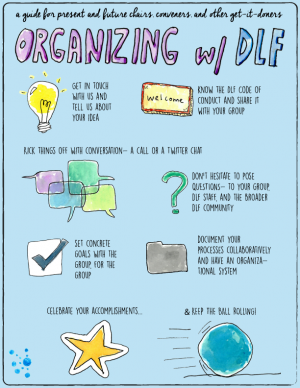Organizing and Sharing Your Work: Difference between revisions
No edit summary |
|||
| Line 1: | Line 1: | ||
[[File:Organizing-with-DLF.png|thumb]] | |||
One of the best ways to broaden your group's reach is by keeping Team DLF updated on your current activities, projects, and plans. If there is something you want us to promote through DLF’s communication channels, please tag us in social media, [https://www.diglib.org/archives/11350/ add it] to the [http://digital-conferences-calendar.info/ DLF Community Calendar], or [Mailto:info@diglib.org let us know] directly—'''we love to help DLF groups share their work!''' | One of the best ways to broaden your group's reach is by keeping Team DLF updated on your current activities, projects, and plans. If there is something you want us to promote through DLF’s communication channels, please tag us in social media, [https://www.diglib.org/archives/11350/ add it] to the [http://digital-conferences-calendar.info/ DLF Community Calendar], or [Mailto:info@diglib.org let us know] directly—'''we love to help DLF groups share their work!''' | ||
Revision as of 09:54, 28 August 2018

One of the best ways to broaden your group's reach is by keeping Team DLF updated on your current activities, projects, and plans. If there is something you want us to promote through DLF’s communication channels, please tag us in social media, add it to the DLF Community Calendar, or let us know directly—we love to help DLF groups share their work!
In terms of organization, many DLF working groups and committees organize drafts and in-progress materials independently using GitHub and Google Drive. DLF’s Open Science Framework (OSF) repositories are good for finished white papers or other grey literature—especially documents for which you would like a DOI. Drop us a line if you'd like access.
General Resources
| “Knowing that things would always be in the Google Drive folder has been a lifesaver -- no digging through email looking for the right attachment, being able to be part of the conference call even when mobile, and super-easy linking in our One Doc to Rule Them All.” —Franny Gaede |
- “How to Organize Google Drive - A Best Practice Guide for Teams”
- Ready to turn your collaboratively-edited Google doc into a nicely-formatted website with a table of contents? This tutorial has you covered.
- OSF Guides, for help using the Open Science Framework
- Maybe you need a crash course in humanities data curation?
DLF-Specific Communications Venues
We are happy to use any and all of these platforms to publish and share DLF community work.
| “[DLF’s Community Calendar is] a great one stop shop for conferences and events in digital + cultural around the world. If you know of an event that should be there, it has a crowd sourced component, so go forth!”—Alex Gil |
- DLF Community Calendar
- DLF-Announce, our primary listserv. Please, please please sign up for this low-traffic list and post about your group’s activities and upcoming meetings there!
- DLF Contribute: get the word out by volunteering for our regular, short-format blog series! We also welcome longer-format guest posts and blog announcements about DLF group activities. Here’s an example.
- DLF on OSF (including OSF for Meetings, our repository for recent DLF Forum presentations)
- DLF on Facebook (We know you like us, but have you “liked” us?)
- Twitter. Get our attention for a retweet or signal boost by tagging [@CLIRDLF and/or using hashtags such as #DLFforum, #DLFteach, #ourDLF, and #DLFvillage.
- Storify (and some DLF groups create and manage their own versions for Twitter chats, like #DLFteach)
- DLF Jobs Board (Don't forget that job postings are free for DLF member institutions!)
- LinkedIn (the DLF group and page)
- Flickr / Instagram
- YouTube / Vimeo
- GitHub
- DLF Wiki (You are here!)
Table of Contents
- About DLF and the Organizers' Toolkit
- Working with Team DLF
- Starting a New Initiative or Working Group
- General Facilitation and Goal-Setting
- Facilitating for Diversity and Inclusion
- Communications and Consensus
- Preventing and Managing Burnout
- Gathering Info/Building Enthusiasm
- Planning an In-Person Meetup
- Setting Up Year-Round Meetings
- Planning Virtual Meetings and Webinars
- Talking and Writing
- Organizing and Sharing Your Work
- In a Nutshell

